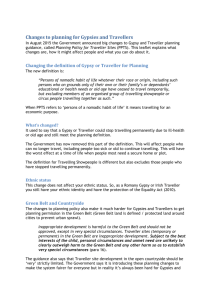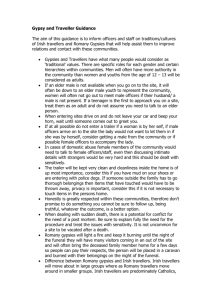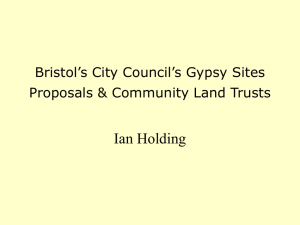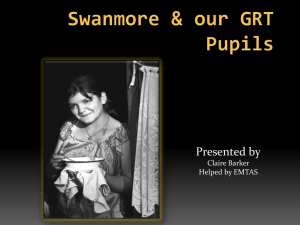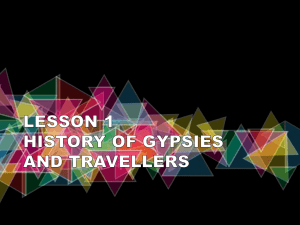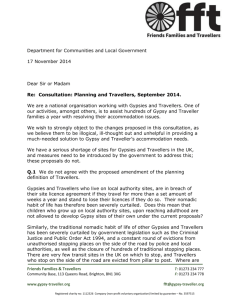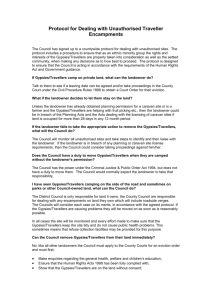Temporary Stop Notices Consultation
advertisement
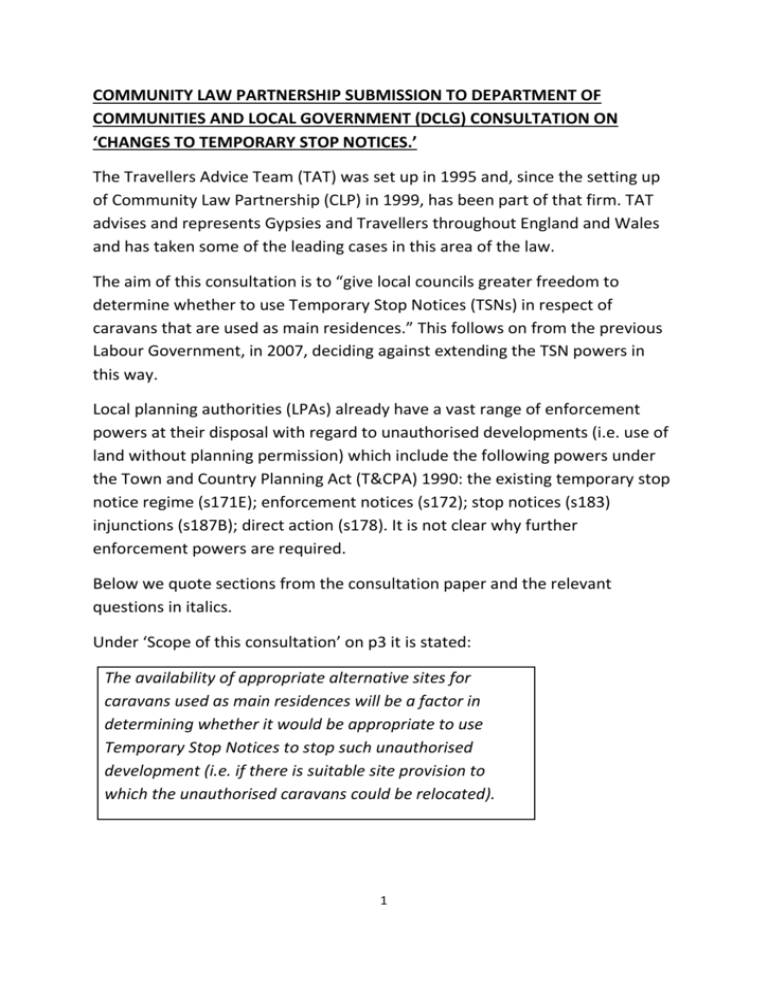
COMMUNITY LAW PARTNERSHIP SUBMISSION TO DEPARTMENT OF COMMUNITIES AND LOCAL GOVERNMENT (DCLG) CONSULTATION ON ‘CHANGES TO TEMPORARY STOP NOTICES.’ The Travellers Advice Team (TAT) was set up in 1995 and, since the setting up of Community Law Partnership (CLP) in 1999, has been part of that firm. TAT advises and represents Gypsies and Travellers throughout England and Wales and has taken some of the leading cases in this area of the law. The aim of this consultation is to “give local councils greater freedom to determine whether to use Temporary Stop Notices (TSNs) in respect of caravans that are used as main residences.” This follows on from the previous Labour Government, in 2007, deciding against extending the TSN powers in this way. Local planning authorities (LPAs) already have a vast range of enforcement powers at their disposal with regard to unauthorised developments (i.e. use of land without planning permission) which include the following powers under the Town and Country Planning Act (T&CPA) 1990: the existing temporary stop notice regime (s171E); enforcement notices (s172); stop notices (s183) injunctions (s187B); direct action (s178). It is not clear why further enforcement powers are required. Below we quote sections from the consultation paper and the relevant questions in italics. Under ‘Scope of this consultation’ on p3 it is stated: The availability of appropriate alternative sites for caravans used as main residences will be a factor in determining whether it would be appropriate to use Temporary Stop Notices to stop such unauthorised development (i.e. if there is suitable site provision to which the unauthorised caravans could be relocated). 1 This rather hits the nail on the head. It is because there are completely insufficient numbers of authorised sites, due to years of failure to ensure their provision by both central and local governments, that some Gypsies and Travellers, out of desperation are forced onto unauthorised developments, especially when the alternative is being evicted “from pillar to post” on unauthorised encampments with all the detrimental effects on health, education and wellbeing that such evictions entail. 1.4 A further aim of the Government’s planning policy for traveller sites is that plan-making and decision-taking should aim to reduce the number of unauthorised developments and encampments and make enforcement more effective. The current proposals amount to a classic case of the cart being put before the horse. The Government’s planning policy Planning policy for traveller sites (PPFTS) aims at LPA’s producing a five-year deliverable supply of sites though this plan does not have to be in place until 27th March 2013. Obviously if this policy is successful – a very big ‘if’ we feel – then it will take a considerable period before sufficient pitches and sites are in place. One could see the argument for increased enforcement powers if and when one reached that situation – but certainly not now. 2.5 In 2007 the previous Government consulted on whether Temporary Stop Notice regulations should be amended to enable their use in respect of caravans used as main residences where there was an alternative authorised site. Local councils generally supported this proposal on the basis that it would help them reduce problems associated with unauthorised development. Given the under-supply of sites at the time, however, this proposal was not taken forward. In the summary of responses, the then Government signalled that it was open to reconsidering whether to amend the Temporary Stop Notice regime at a point where site provision has increased. Unfortunately, the situation remains as it did in 2007 and, therefore, there are no grounds for changing TSN powers at this stage – see further below. 2.6 The Government has also introduced stronger enforcement powers in the Localism Act 2011, which apply equally to breaches of planning control relating 2 to caravans as all other types of development. They enable councils to deal effectively with applications for retrospective planning permission where an enforcement notice has already been issued, give greater powers over concealed breaches of planning control, and enable heavier penalties to be served following breaches of planning conditions. The original proposals of this Government in the Localism Bill would have made retrospective planning applications virtually impossible (for everyone not just for Gypsies and Travellers, of course). After representations were made by Lord Avebury, Baroness Whitaker and others, the Government accepted that what they intended to prevent was the phenomenon of simultaneous enforcement notice and planning appeals. However the extension of the TSN powers, as proposed, would effectively bring in a ban on retrospective applications by the back door. It must be remembered that most Gypsies and Travellers who move onto land without permission are doing so out of desperation and due to the failures of local and central governments to ensure that adequate provision is ensured (despite there having been a duty to provide sites under the Caravan Sites Act 1968 between 1970 and 1994 and guidance requiring allocation of sufficient land for sites since 5th January 1994). 3.5 …In January 2007 there were 16,610 Gypsy and Traveller caravans in England, 13,070 (78.7%) of which were on authorised sites. Authorised site provision has subsequently increased to accommodate 15,900 caravans in January 2012 (84.8% of a total 18,750 caravans in England). 3.6 This is in the context of a longer-term increase in authorised site provision for travellers; between January 1994 and January 2012 the proportion of Gypsy and Traveller caravans on authorised sites has increased from 70% to 84.8% (1994 as the year in which the Caravans Act 1968 was repealed and Circular 1/94 Gypsy Sites and Planning issued). 3.7 The last five Gypsy and Traveller caravan counts indicate that caravans which are in unauthorised developments on travellers’ own land has declined by 21% from 2,400 in January 2010 to 1,890 in January 2012. 3 It has long been recognised that the Caravan Count system is seriously inaccurate and involves massive undercounting (see Counting Gypsies and Travellers: A Review of the Gypsy Caravan Count System, Niner, Office of the Deputy Prime Minister, 2004). The caravan counts do show a reduction in the proportion of caravans on unauthorised sites but the numbers on unauthorised sites, which themselves are certainly underestimates, remain stubbornly high. They were 4,176 in January 1979, 3,994 in July 2006 and 3,158 in July 2012. The counts do not differentiate between permanent and temporary permissions. A large number of permissions obtained by Gypsies and Travellers in recent years have been temporary permissions. The counts suggest that almost all the increase in authorised sites in recent years is on private sites. In the 6 years between July 2006 (the 1st count after Circular 01/06) and July 2012, caravans on private authorised sites increased from 5,815 to 9,426, but numbers on authorised socially rented sites only increased from 6,560 to 6,829 (at least part of which will be due to more intensive occupation of existing pitches). The counts are only one way of understanding need, and a very poor way because they only measure caravans, not people. They ignore housed Gypsies and Travellers, who make up between half and two thirds of Gypsies and Travellers, many of whom really require the provision of a pitch on a site and some of whom are being caused psychiatric harm by being forced to remain in housing against their will. The Gypsy and Traveller Accommodation Needs Assessments (GTANAs) give a more comprehensive picture of need at the local level, although they need to be treated with caution on the basis that those carried out in the 2006–9 period were the first ever carried out. However, they give an indication of the scale of need, and the pace at which it is being addressed. Assessing local authorities’ progress in meeting the accommodation needs of Gypsies and 4 Travellers in England and Wales, Brown, Henning and Niner for the Equality & Human Rights Commission, 2011, found that there was a need for 5,821 additional residential pitches (excluding transit pitches) in England in the first 5 years after the local needs assessments, but that, at the rate of progress achieved in 2006-9, it will take about 16 years to meet those needs, and around 27 years if temporary and personal consents are excluded (by which time there will be further significant needs because of household growth). Q1. Will this proposal improve local councils’ ability to use Temporary Stop Notices in respect of breaches of planning control related to using caravans as main residences? We do not think TSN powers should be extended so we will not answer this question directly. It is likely that the proposal would lead to increased applications for judicial review, that less well-off councils would not use it and that, hence, it would further distort Gypsy and Traveller site provision by enabling better-off councils to transfer their obligations in respect of Gypsies and Travellers to less well-off councils. Q2. Will the impacts of this proposal on caravan occupants be acceptable? No. See our explanation above. We also believe that use of such powers may breach the rights of Gypsies and Travellers under Articles 6, 8 and 14 of the European Convention on Human Rights and the ECHR’s First Protocol and would, therefore, breach the Human Rights Act (HRA) 1998. Article 6 concerns right to a fair hearing – there are no appeal powers with a TSN despite the fact that the proposal would impose harsh controls on the use of homes and properties of a particularly vulnerable and disadvantaged minority group. Article 8 concerns right to respect for private and family life and home – such Draconian powers as these, preventing Gypsy and Traveller families from maintaining their traditional lifestyle, interfering with their enjoyment of their caravan homes, denying them use of their property and forcing families back 5 onto unauthorised roadside encampments, would amount to a breach of this Article. Article 14 concerns prohibition of discrimination (to be read in this instance with Articles 6 and 8 and First Protocol Article 1) – see further below. In particular the increased difference between the treatment of Gypsies and Travellers on the one hand and house-dwellers with their protection under section 171F(1)(a) would be discrimination in the exercise of a Convention right. In many cases use of a TSN by a local authority may be contrary to the Public Sector Equality Duty introduced by the Equality Act 2010 section 149, particularly the requirement to have due regard to the need to advance equality of opportunity between people who share a protected characteristic (which includes Irish Travellers and Romani Gypsies) and those who do not. In cases where children are involved, developing case law means that use of TSNs also may be unlawful if the best interests of the children are not properly taken into account (see, for example, AZ v the Secretary of State for Communities and Local Government and South Gloucestershire DC [2012] EWHC 3660 (Admin)). In its 14th Report, the Joint Committee on Human Rights on The Convention on the Elimination of all forms of Racial Discrimination expressed the following concerns in respect of the current TSN provisions: “We are concerned that the approach which the government adopted during Parliament's consideration of this Bill has now been altered in a way which may have significant human rights implications.” “We are concerned that the differential treatment of the homes of Travellers permitted by the regulations risks breach both of obligations under CERD (in particular Article 2.1(a) and Article 5(e)(iii)) and of Article 14 ECHR read with Article 1 of Protocol 1 ECHR.” 6 Those concerns would be exacerbated by the proposed changes. http://www.publications.parliament.uk/pa/jt200405/jtselect/jtrights/88/8810. htm Q3. Would guidance assist local councils in determining whether and how to use Temporary Stop Notices in respect of unauthorised development? We do not think TSN powers should be extended so we will not answer this question directly. Guidance that local planning authorities should allocate sufficient land for Gypsy caravan sites has been almost universally ignored for over 19 years. In such circumstances there is no reason to believe that guidance would be followed in a constructive and positive manner. Rather it would form the basis of “have-borne-in-mind” mantras that bear no relation to the truth and exacerbate the distrust that the Gypsy and Traveller community has learnt to feel for local planning authorities. Q4. Are there other or alternative reforms that would make Temporary Stop Notices more effective? Yes, requiring local planning authorities to allocate sufficient land for Gypsy and Traveller sites, overseeing that requirement with the vigour and determination that equivalent requirements for housing and aggregate provision are overseen and introducing substantial penalties (including financial penalties) for authorities that continue to fail to allocate sufficient land. If enough land were allocated LPAs using TSN would have less of a risk of judicial review. 5.2….Local councils remain reluctant to use Temporary Stop Notice powers as this would serve to displace the issue to other unauthorised sites in the same or other local council areas (or may have the consequence of requiring caravans to relocate to less suitable sites). This encapsulates one of our main points. What is the point in forcing Gypsy and Traveller families onto unauthorised encampments in much more 7 unsuitable locations, increasing enforcement costs related to such encampments. It is simply not the case that there are available pitches to direct families to. In addition to the burden imposed on local planning authorities, some of which are willing to incur this cost for populist reasons, there is also a significant cost to the police who would be much better employed dealing with their primary role of reducing and solving crime and apprehending criminals. 6.1 Section 171F(1)(a) of the Town and Country Planning Act 1990 provides that a Temporary Stop Notice does not prohibit the use of a building as a dwelling house. Revoking Statutory Instrument 2005/206 would enable greater freedom for a Temporary Stop Notice to be used in respect of a caravan used as a main residence. This difference of approach is proposed because of the different impacts associated with each type of development. The potential detrimental impacts of caravans being moved onto land and used as main residences will generally be greater than a change of use to an existing building which is already part of the landscape. This is another of the fundamental objections to this proposal. The discrimination between Gypsies and Travellers and the rest of the community is simply not justifiable. If someone converts a barn (used, say, for storing hay) into a house, then that can have just as detrimental an impact on the countryside as the setting up of a Gypsy/Traveller site. This proposal is not justifiable in terms either of the Equality Act 2010 or Article 14. Further the argument given above is simplistic, limiting consideration to the impact of the main element of a structure and ignoring other consequences of an illegal dwelling house, including traffic and the visual impact of secondary alterations to the building. The difference in treatment exacerbates the divisions between Gypsies and Travellers on the one hand and house-dwellers on the others, adding to the distrust and sense of unfairness and alienation felt by the Gypsy and Traveller community. Q5. Do you agree with the potential impacts of this proposal as set out above? No – see our reasons above. 8 Q6. Do you have any evidence that is relevant to this proposal (in relation to use of Temporary Stop Notices, relating to caravans within unauthorised developments, impacts on caravan occupants, equalities implications, or any other impacts)? We do not wish to put forward any evidence other than our arguments above in this paper. Q7. Are there any other comments you wish to make as part of this consultation? Gypsies and Travellers experience the poorest outcomes of any ethnic group within the UK based on a whole range of measures. Many more applications from Gypsies and Travellers as opposed to applications from settled people are refused, and approvals only won by having to go through an appeal process, which means the planning system is much more expensive and difficult for Gypsies and Travellers in contrast to other groups in society. The equivalent sections of the house-dwelling community obtain accommodation with less expense, delay and worry than Gypsies and Travellers Some 20 – 25% of the Gypsy and Traveller population who live in caravans are statutorily homeless as opposed to approximately 0.1% of the settled population. With 326 local planning authorities in England, Gypsy and Traveller support groups and organisations do not have the resources to engage in and challenge local authorities’ needs assessments and plan reviews. Without the resources to engage in plans and speak for Gypsies and Travellers, in many cases the only pressures on local authorities will be from those opposed to provision. Consequently, Gypsy and Traveller communities in many cases are excluded from the development plan process, with the risk that the severe shortage of accommodation to meet their needs (and the resultant impacts on the settled community) will continue for another generation. This is a major difference between Gypsies and Travellers on the one hand and house-dwellers whose interests are protected by a powerful house-building lobby. It could be 9 addressed by specifically channelling some of the resources from the Community & Neighbourhoods Planning Scheme to supporting Gypsy and Traveller organisations in engaging in needs assessments and development plans. We ask that Gypsies and Travellers should always be referred to by using a capitalised first letter as is done with other ethnic groups and as the Welsh Assembly Government does with Gypsies and Travellers. The Scottish Government has introduced regulations that avoid discrimination against Gypsies and Travellers (The Town and Country Planning (Temporary Stop Notice) (Scotland) Regulations 2009). The Welsh Government has not introduced TSNs at all. Neither has suffered dire consequences as a result. In conclusion, we are most strongly opposed on behalf of our clients to this proposal. It would further disadvantage already disadvantaged ethnic minorities and add to their sense of alienation and injustice. Community Law Partnership February 2013 10

